Analysis of Legislation and Ethics in the UK Travel and Tourism Sector
VerifiedAdded on 2020/12/10
|15
|4341
|340
Report
AI Summary
This report provides a comprehensive overview of the legal and ethical considerations within the UK travel and tourism sector. It begins by explaining the legal and regulatory frameworks, including sea, air, and surface laws, impacting the industry. The report then delves into the impacts of health, safety, and security legislation, emphasizing the importance of workplace safety and data protection. It analyzes laws related to equality, such as the Employment Protection Act and the Equality Act, highlighting the importance of fair employment practices. Furthermore, the report examines contract and consumer protection legislation, ensuring the rights of travelers are protected. Finally, it explores ethical dilemmas faced by the industry, including corporate social responsibility, using TUI as a case study. The report concludes by summarizing the key findings and emphasizing the importance of adhering to both legal and ethical standards within the travel and tourism sector to ensure sustainable and responsible business practices.
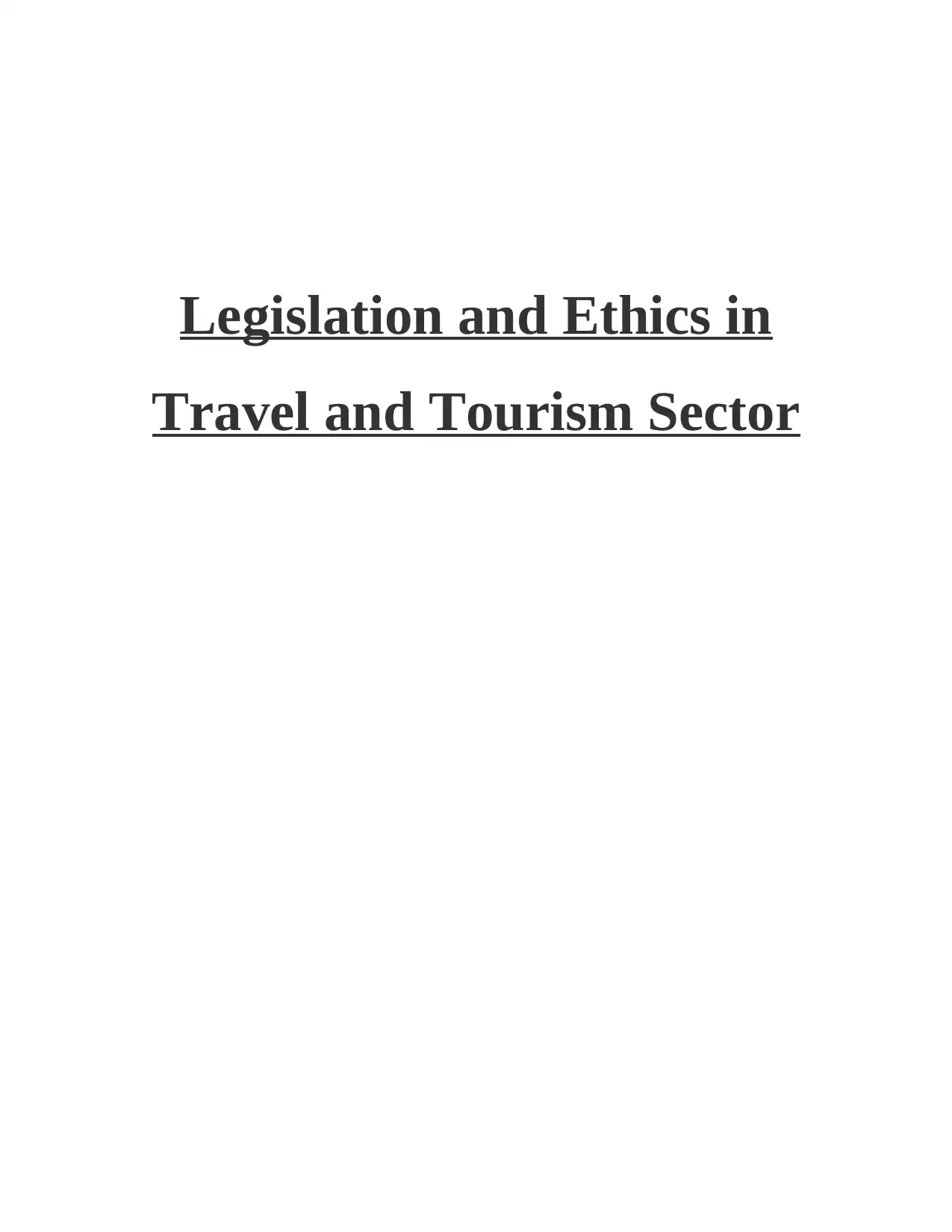
Legislation and Ethics in
Travel and Tourism Sector
Travel and Tourism Sector
Paraphrase This Document
Need a fresh take? Get an instant paraphrase of this document with our AI Paraphraser
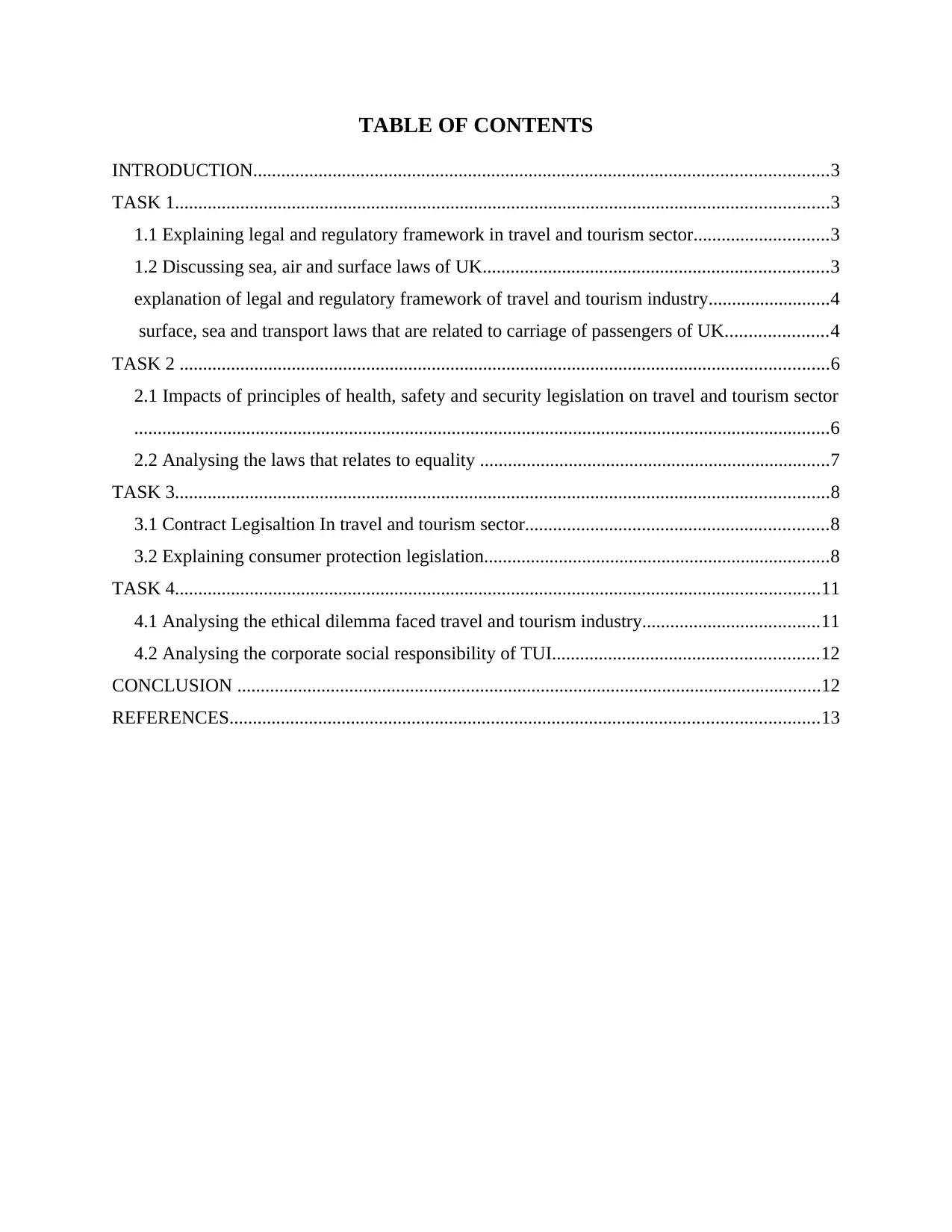
TABLE OF CONTENTS
INTRODUCTION...........................................................................................................................3
TASK 1............................................................................................................................................3
1.1 Explaining legal and regulatory framework in travel and tourism sector.............................3
1.2 Discussing sea, air and surface laws of UK..........................................................................3
explanation of legal and regulatory framework of travel and tourism industry..........................4
surface, sea and transport laws that are related to carriage of passengers of UK......................4
TASK 2 ...........................................................................................................................................6
2.1 Impacts of principles of health, safety and security legislation on travel and tourism sector
.....................................................................................................................................................6
2.2 Analysing the laws that relates to equality ...........................................................................7
TASK 3............................................................................................................................................8
3.1 Contract Legisaltion In travel and tourism sector.................................................................8
3.2 Explaining consumer protection legislation..........................................................................8
TASK 4..........................................................................................................................................11
4.1 Analysing the ethical dilemma faced travel and tourism industry......................................11
4.2 Analysing the corporate social responsibility of TUI.........................................................12
CONCLUSION .............................................................................................................................12
REFERENCES..............................................................................................................................13
INTRODUCTION...........................................................................................................................3
TASK 1............................................................................................................................................3
1.1 Explaining legal and regulatory framework in travel and tourism sector.............................3
1.2 Discussing sea, air and surface laws of UK..........................................................................3
explanation of legal and regulatory framework of travel and tourism industry..........................4
surface, sea and transport laws that are related to carriage of passengers of UK......................4
TASK 2 ...........................................................................................................................................6
2.1 Impacts of principles of health, safety and security legislation on travel and tourism sector
.....................................................................................................................................................6
2.2 Analysing the laws that relates to equality ...........................................................................7
TASK 3............................................................................................................................................8
3.1 Contract Legisaltion In travel and tourism sector.................................................................8
3.2 Explaining consumer protection legislation..........................................................................8
TASK 4..........................................................................................................................................11
4.1 Analysing the ethical dilemma faced travel and tourism industry......................................11
4.2 Analysing the corporate social responsibility of TUI.........................................................12
CONCLUSION .............................................................................................................................12
REFERENCES..............................................................................................................................13
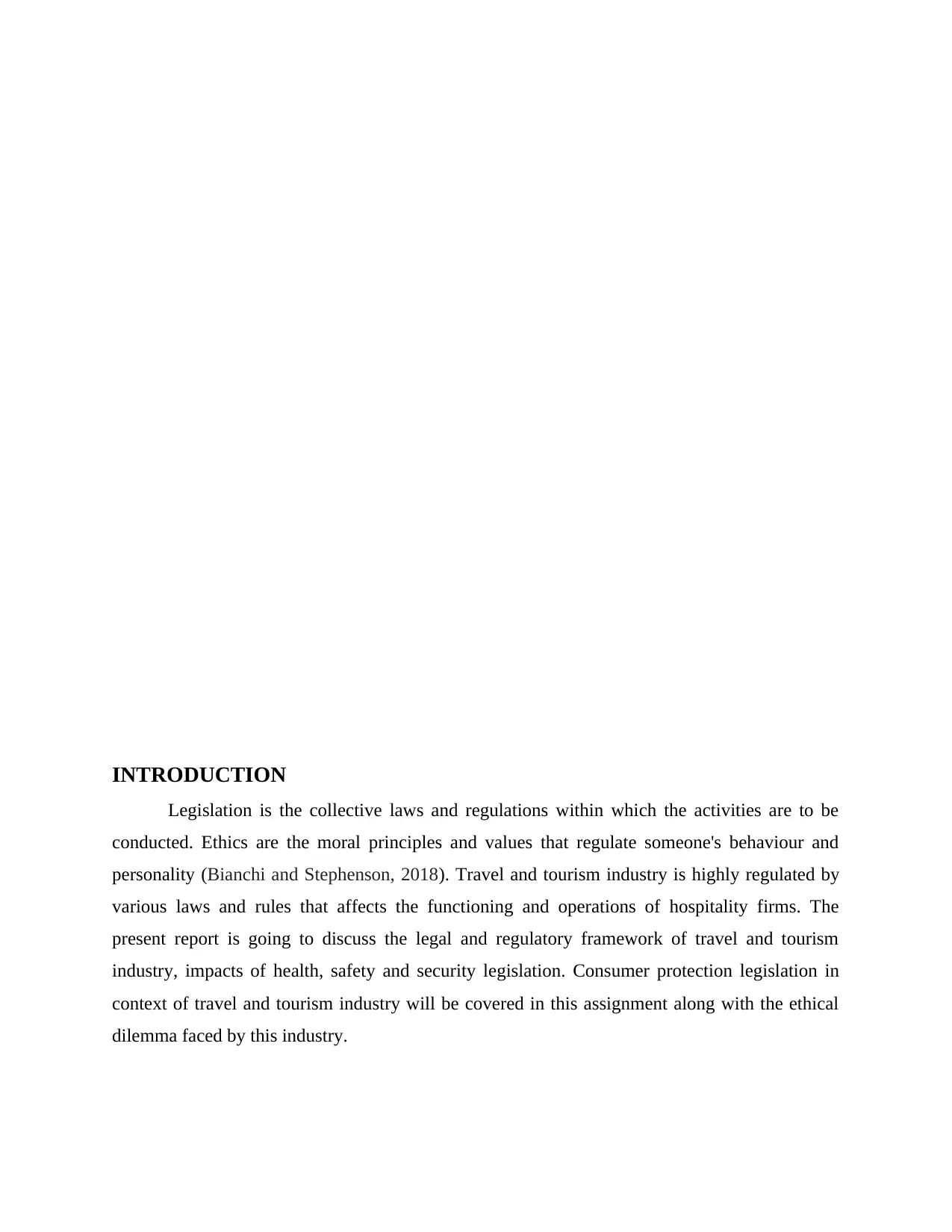
INTRODUCTION
Legislation is the collective laws and regulations within which the activities are to be
conducted. Ethics are the moral principles and values that regulate someone's behaviour and
personality (Bianchi and Stephenson, 2018). Travel and tourism industry is highly regulated by
various laws and rules that affects the functioning and operations of hospitality firms. The
present report is going to discuss the legal and regulatory framework of travel and tourism
industry, impacts of health, safety and security legislation. Consumer protection legislation in
context of travel and tourism industry will be covered in this assignment along with the ethical
dilemma faced by this industry.
Legislation is the collective laws and regulations within which the activities are to be
conducted. Ethics are the moral principles and values that regulate someone's behaviour and
personality (Bianchi and Stephenson, 2018). Travel and tourism industry is highly regulated by
various laws and rules that affects the functioning and operations of hospitality firms. The
present report is going to discuss the legal and regulatory framework of travel and tourism
industry, impacts of health, safety and security legislation. Consumer protection legislation in
context of travel and tourism industry will be covered in this assignment along with the ethical
dilemma faced by this industry.
⊘ This is a preview!⊘
Do you want full access?
Subscribe today to unlock all pages.

Trusted by 1+ million students worldwide
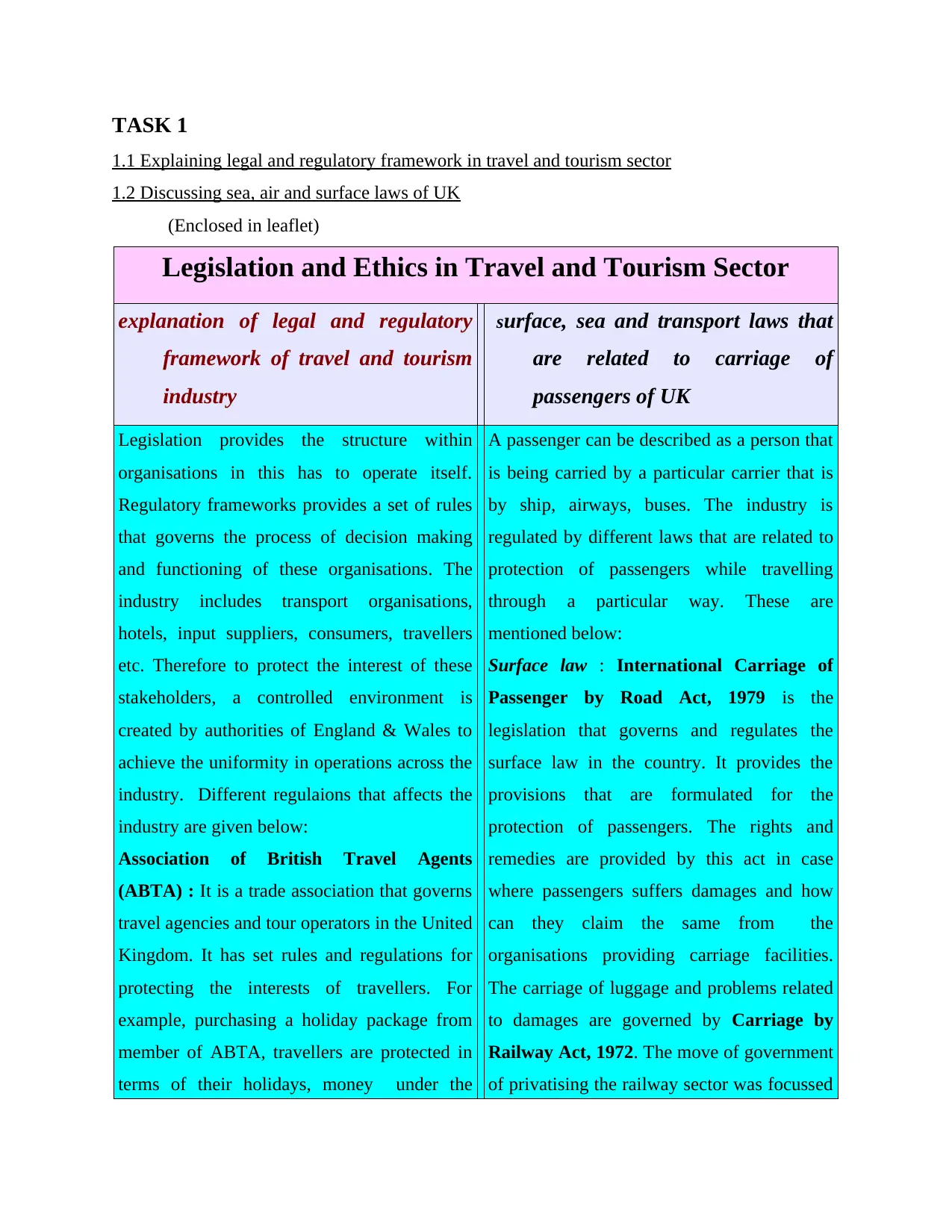
TASK 1
1.1 Explaining legal and regulatory framework in travel and tourism sector
1.2 Discussing sea, air and surface laws of UK
(Enclosed in leaflet)
Legislation and Ethics in Travel and Tourism Sector
explanation of legal and regulatory
framework of travel and tourism
industry
surface, sea and transport laws that
are related to carriage of
passengers of UK
Legislation provides the structure within
organisations in this has to operate itself.
Regulatory frameworks provides a set of rules
that governs the process of decision making
and functioning of these organisations. The
industry includes transport organisations,
hotels, input suppliers, consumers, travellers
etc. Therefore to protect the interest of these
stakeholders, a controlled environment is
created by authorities of England & Wales to
achieve the uniformity in operations across the
industry. Different regulaions that affects the
industry are given below:
Association of British Travel Agents
(ABTA) : It is a trade association that governs
travel agencies and tour operators in the United
Kingdom. It has set rules and regulations for
protecting the interests of travellers. For
example, purchasing a holiday package from
member of ABTA, travellers are protected in
terms of their holidays, money under the
A passenger can be described as a person that
is being carried by a particular carrier that is
by ship, airways, buses. The industry is
regulated by different laws that are related to
protection of passengers while travelling
through a particular way. These are
mentioned below:
Surface law : International Carriage of
Passenger by Road Act, 1979 is the
legislation that governs and regulates the
surface law in the country. It provides the
provisions that are formulated for the
protection of passengers. The rights and
remedies are provided by this act in case
where passengers suffers damages and how
can they claim the same from the
organisations providing carriage facilities.
The carriage of luggage and problems related
to damages are governed by Carriage by
Railway Act, 1972. The move of government
of privatising the railway sector was focussed
1.1 Explaining legal and regulatory framework in travel and tourism sector
1.2 Discussing sea, air and surface laws of UK
(Enclosed in leaflet)
Legislation and Ethics in Travel and Tourism Sector
explanation of legal and regulatory
framework of travel and tourism
industry
surface, sea and transport laws that
are related to carriage of
passengers of UK
Legislation provides the structure within
organisations in this has to operate itself.
Regulatory frameworks provides a set of rules
that governs the process of decision making
and functioning of these organisations. The
industry includes transport organisations,
hotels, input suppliers, consumers, travellers
etc. Therefore to protect the interest of these
stakeholders, a controlled environment is
created by authorities of England & Wales to
achieve the uniformity in operations across the
industry. Different regulaions that affects the
industry are given below:
Association of British Travel Agents
(ABTA) : It is a trade association that governs
travel agencies and tour operators in the United
Kingdom. It has set rules and regulations for
protecting the interests of travellers. For
example, purchasing a holiday package from
member of ABTA, travellers are protected in
terms of their holidays, money under the
A passenger can be described as a person that
is being carried by a particular carrier that is
by ship, airways, buses. The industry is
regulated by different laws that are related to
protection of passengers while travelling
through a particular way. These are
mentioned below:
Surface law : International Carriage of
Passenger by Road Act, 1979 is the
legislation that governs and regulates the
surface law in the country. It provides the
provisions that are formulated for the
protection of passengers. The rights and
remedies are provided by this act in case
where passengers suffers damages and how
can they claim the same from the
organisations providing carriage facilities.
The carriage of luggage and problems related
to damages are governed by Carriage by
Railway Act, 1972. The move of government
of privatising the railway sector was focussed
Paraphrase This Document
Need a fresh take? Get an instant paraphrase of this document with our AI Paraphraser
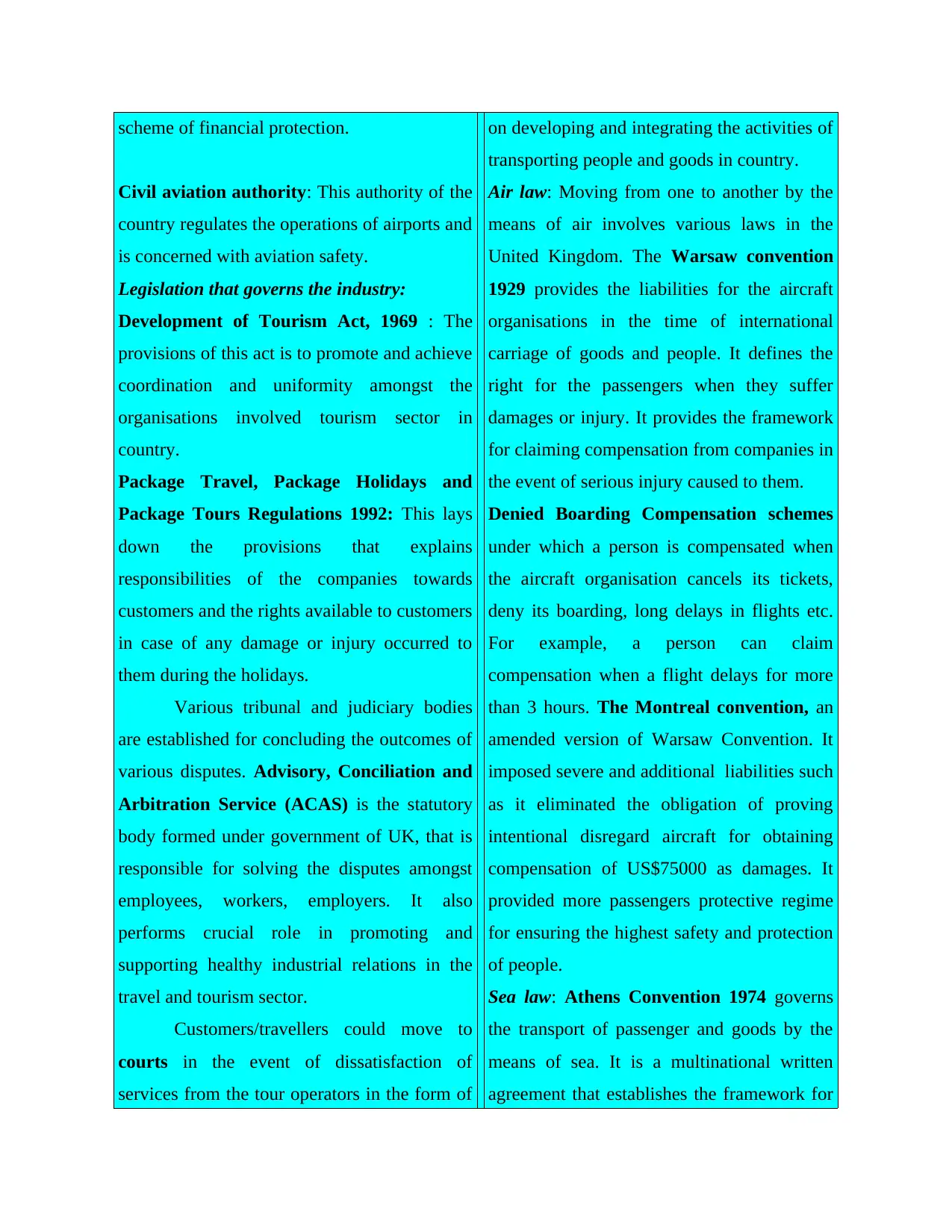
scheme of financial protection.
Civil aviation authority: This authority of the
country regulates the operations of airports and
is concerned with aviation safety.
Legislation that governs the industry:
Development of Tourism Act, 1969 : The
provisions of this act is to promote and achieve
coordination and uniformity amongst the
organisations involved tourism sector in
country.
Package Travel, Package Holidays and
Package Tours Regulations 1992: This lays
down the provisions that explains
responsibilities of the companies towards
customers and the rights available to customers
in case of any damage or injury occurred to
them during the holidays.
Various tribunal and judiciary bodies
are established for concluding the outcomes of
various disputes. Advisory, Conciliation and
Arbitration Service (ACAS) is the statutory
body formed under government of UK, that is
responsible for solving the disputes amongst
employees, workers, employers. It also
performs crucial role in promoting and
supporting healthy industrial relations in the
travel and tourism sector.
Customers/travellers could move to
courts in the event of dissatisfaction of
services from the tour operators in the form of
on developing and integrating the activities of
transporting people and goods in country.
Air law: Moving from one to another by the
means of air involves various laws in the
United Kingdom. The Warsaw convention
1929 provides the liabilities for the aircraft
organisations in the time of international
carriage of goods and people. It defines the
right for the passengers when they suffer
damages or injury. It provides the framework
for claiming compensation from companies in
the event of serious injury caused to them.
Denied Boarding Compensation schemes
under which a person is compensated when
the aircraft organisation cancels its tickets,
deny its boarding, long delays in flights etc.
For example, a person can claim
compensation when a flight delays for more
than 3 hours. The Montreal convention, an
amended version of Warsaw Convention. It
imposed severe and additional liabilities such
as it eliminated the obligation of proving
intentional disregard aircraft for obtaining
compensation of US$75000 as damages. It
provided more passengers protective regime
for ensuring the highest safety and protection
of people.
Sea law: Athens Convention 1974 governs
the transport of passenger and goods by the
means of sea. It is a multinational written
agreement that establishes the framework for
Civil aviation authority: This authority of the
country regulates the operations of airports and
is concerned with aviation safety.
Legislation that governs the industry:
Development of Tourism Act, 1969 : The
provisions of this act is to promote and achieve
coordination and uniformity amongst the
organisations involved tourism sector in
country.
Package Travel, Package Holidays and
Package Tours Regulations 1992: This lays
down the provisions that explains
responsibilities of the companies towards
customers and the rights available to customers
in case of any damage or injury occurred to
them during the holidays.
Various tribunal and judiciary bodies
are established for concluding the outcomes of
various disputes. Advisory, Conciliation and
Arbitration Service (ACAS) is the statutory
body formed under government of UK, that is
responsible for solving the disputes amongst
employees, workers, employers. It also
performs crucial role in promoting and
supporting healthy industrial relations in the
travel and tourism sector.
Customers/travellers could move to
courts in the event of dissatisfaction of
services from the tour operators in the form of
on developing and integrating the activities of
transporting people and goods in country.
Air law: Moving from one to another by the
means of air involves various laws in the
United Kingdom. The Warsaw convention
1929 provides the liabilities for the aircraft
organisations in the time of international
carriage of goods and people. It defines the
right for the passengers when they suffer
damages or injury. It provides the framework
for claiming compensation from companies in
the event of serious injury caused to them.
Denied Boarding Compensation schemes
under which a person is compensated when
the aircraft organisation cancels its tickets,
deny its boarding, long delays in flights etc.
For example, a person can claim
compensation when a flight delays for more
than 3 hours. The Montreal convention, an
amended version of Warsaw Convention. It
imposed severe and additional liabilities such
as it eliminated the obligation of proving
intentional disregard aircraft for obtaining
compensation of US$75000 as damages. It
provided more passengers protective regime
for ensuring the highest safety and protection
of people.
Sea law: Athens Convention 1974 governs
the transport of passenger and goods by the
means of sea. It is a multinational written
agreement that establishes the framework for
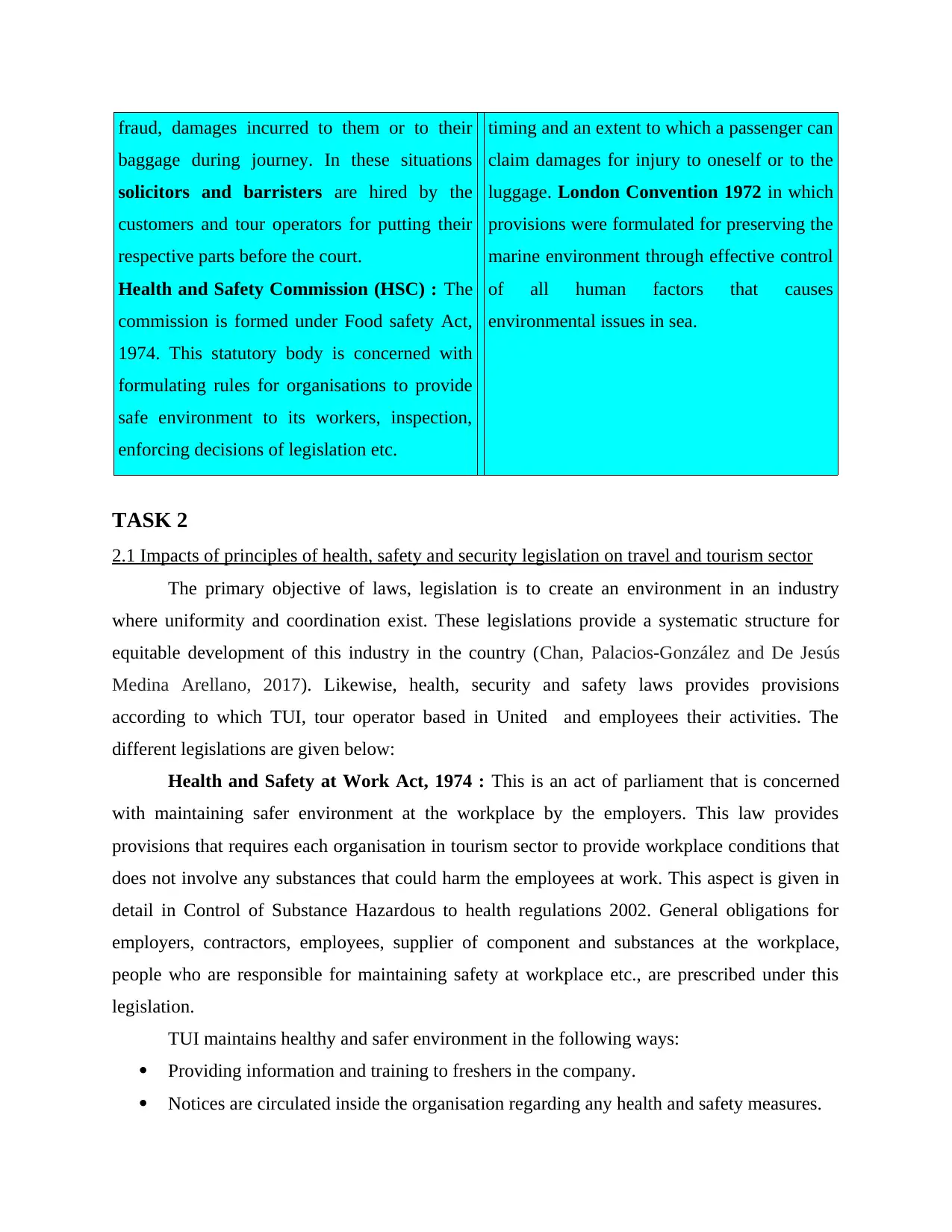
fraud, damages incurred to them or to their
baggage during journey. In these situations
solicitors and barristers are hired by the
customers and tour operators for putting their
respective parts before the court.
Health and Safety Commission (HSC) : The
commission is formed under Food safety Act,
1974. This statutory body is concerned with
formulating rules for organisations to provide
safe environment to its workers, inspection,
enforcing decisions of legislation etc.
timing and an extent to which a passenger can
claim damages for injury to oneself or to the
luggage. London Convention 1972 in which
provisions were formulated for preserving the
marine environment through effective control
of all human factors that causes
environmental issues in sea.
TASK 2
2.1 Impacts of principles of health, safety and security legislation on travel and tourism sector
The primary objective of laws, legislation is to create an environment in an industry
where uniformity and coordination exist. These legislations provide a systematic structure for
equitable development of this industry in the country (Chan, Palacios‐González and De Jesús
Medina Arellano, 2017). Likewise, health, security and safety laws provides provisions
according to which TUI, tour operator based in United and employees their activities. The
different legislations are given below:
Health and Safety at Work Act, 1974 : This is an act of parliament that is concerned
with maintaining safer environment at the workplace by the employers. This law provides
provisions that requires each organisation in tourism sector to provide workplace conditions that
does not involve any substances that could harm the employees at work. This aspect is given in
detail in Control of Substance Hazardous to health regulations 2002. General obligations for
employers, contractors, employees, supplier of component and substances at the workplace,
people who are responsible for maintaining safety at workplace etc., are prescribed under this
legislation.
TUI maintains healthy and safer environment in the following ways:
Providing information and training to freshers in the company.
Notices are circulated inside the organisation regarding any health and safety measures.
baggage during journey. In these situations
solicitors and barristers are hired by the
customers and tour operators for putting their
respective parts before the court.
Health and Safety Commission (HSC) : The
commission is formed under Food safety Act,
1974. This statutory body is concerned with
formulating rules for organisations to provide
safe environment to its workers, inspection,
enforcing decisions of legislation etc.
timing and an extent to which a passenger can
claim damages for injury to oneself or to the
luggage. London Convention 1972 in which
provisions were formulated for preserving the
marine environment through effective control
of all human factors that causes
environmental issues in sea.
TASK 2
2.1 Impacts of principles of health, safety and security legislation on travel and tourism sector
The primary objective of laws, legislation is to create an environment in an industry
where uniformity and coordination exist. These legislations provide a systematic structure for
equitable development of this industry in the country (Chan, Palacios‐González and De Jesús
Medina Arellano, 2017). Likewise, health, security and safety laws provides provisions
according to which TUI, tour operator based in United and employees their activities. The
different legislations are given below:
Health and Safety at Work Act, 1974 : This is an act of parliament that is concerned
with maintaining safer environment at the workplace by the employers. This law provides
provisions that requires each organisation in tourism sector to provide workplace conditions that
does not involve any substances that could harm the employees at work. This aspect is given in
detail in Control of Substance Hazardous to health regulations 2002. General obligations for
employers, contractors, employees, supplier of component and substances at the workplace,
people who are responsible for maintaining safety at workplace etc., are prescribed under this
legislation.
TUI maintains healthy and safer environment in the following ways:
Providing information and training to freshers in the company.
Notices are circulated inside the organisation regarding any health and safety measures.
⊘ This is a preview!⊘
Do you want full access?
Subscribe today to unlock all pages.

Trusted by 1+ million students worldwide
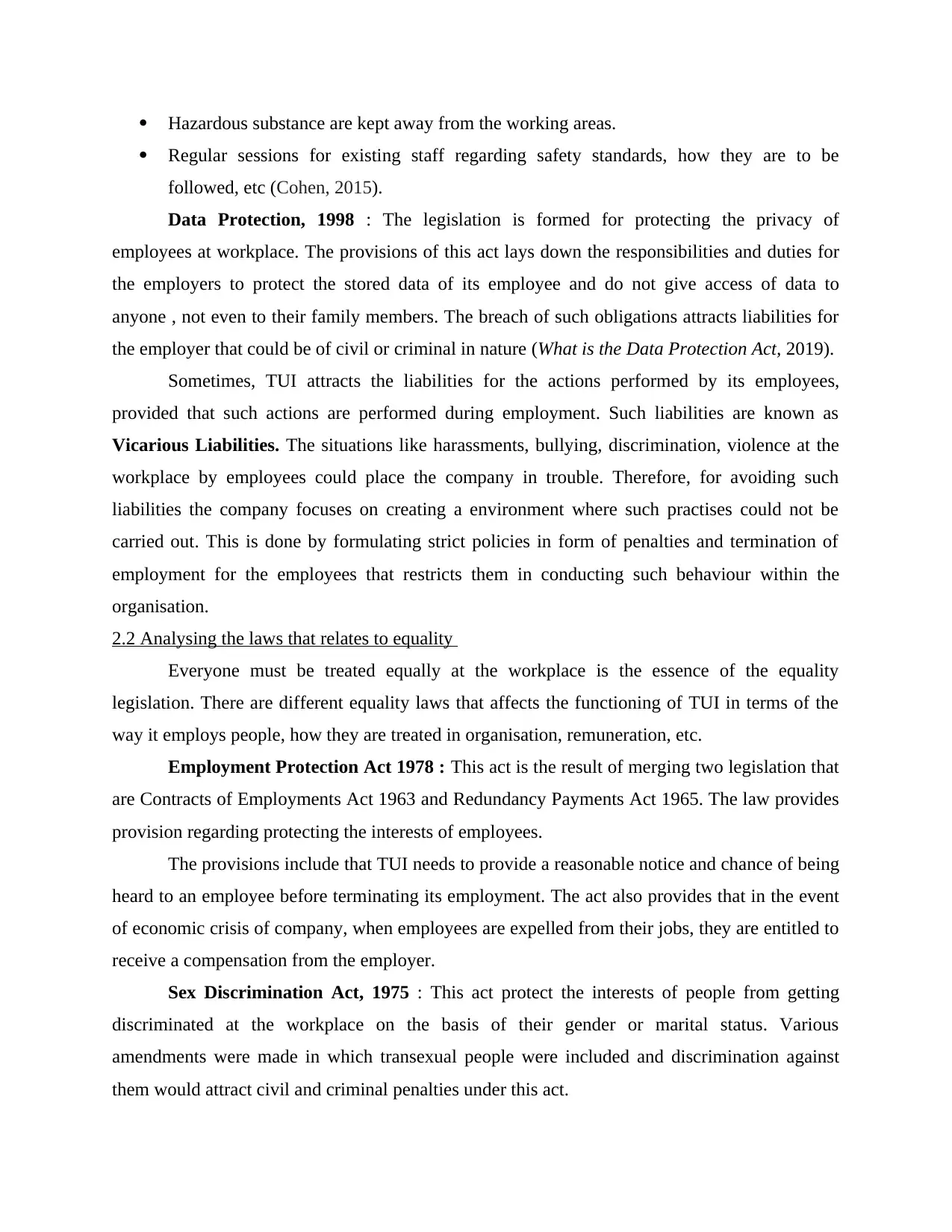
Hazardous substance are kept away from the working areas.
Regular sessions for existing staff regarding safety standards, how they are to be
followed, etc (Cohen, 2015).
Data Protection, 1998 : The legislation is formed for protecting the privacy of
employees at workplace. The provisions of this act lays down the responsibilities and duties for
the employers to protect the stored data of its employee and do not give access of data to
anyone , not even to their family members. The breach of such obligations attracts liabilities for
the employer that could be of civil or criminal in nature (What is the Data Protection Act, 2019).
Sometimes, TUI attracts the liabilities for the actions performed by its employees,
provided that such actions are performed during employment. Such liabilities are known as
Vicarious Liabilities. The situations like harassments, bullying, discrimination, violence at the
workplace by employees could place the company in trouble. Therefore, for avoiding such
liabilities the company focuses on creating a environment where such practises could not be
carried out. This is done by formulating strict policies in form of penalties and termination of
employment for the employees that restricts them in conducting such behaviour within the
organisation.
2.2 Analysing the laws that relates to equality
Everyone must be treated equally at the workplace is the essence of the equality
legislation. There are different equality laws that affects the functioning of TUI in terms of the
way it employs people, how they are treated in organisation, remuneration, etc.
Employment Protection Act 1978 : This act is the result of merging two legislation that
are Contracts of Employments Act 1963 and Redundancy Payments Act 1965. The law provides
provision regarding protecting the interests of employees.
The provisions include that TUI needs to provide a reasonable notice and chance of being
heard to an employee before terminating its employment. The act also provides that in the event
of economic crisis of company, when employees are expelled from their jobs, they are entitled to
receive a compensation from the employer.
Sex Discrimination Act, 1975 : This act protect the interests of people from getting
discriminated at the workplace on the basis of their gender or marital status. Various
amendments were made in which transexual people were included and discrimination against
them would attract civil and criminal penalties under this act.
Regular sessions for existing staff regarding safety standards, how they are to be
followed, etc (Cohen, 2015).
Data Protection, 1998 : The legislation is formed for protecting the privacy of
employees at workplace. The provisions of this act lays down the responsibilities and duties for
the employers to protect the stored data of its employee and do not give access of data to
anyone , not even to their family members. The breach of such obligations attracts liabilities for
the employer that could be of civil or criminal in nature (What is the Data Protection Act, 2019).
Sometimes, TUI attracts the liabilities for the actions performed by its employees,
provided that such actions are performed during employment. Such liabilities are known as
Vicarious Liabilities. The situations like harassments, bullying, discrimination, violence at the
workplace by employees could place the company in trouble. Therefore, for avoiding such
liabilities the company focuses on creating a environment where such practises could not be
carried out. This is done by formulating strict policies in form of penalties and termination of
employment for the employees that restricts them in conducting such behaviour within the
organisation.
2.2 Analysing the laws that relates to equality
Everyone must be treated equally at the workplace is the essence of the equality
legislation. There are different equality laws that affects the functioning of TUI in terms of the
way it employs people, how they are treated in organisation, remuneration, etc.
Employment Protection Act 1978 : This act is the result of merging two legislation that
are Contracts of Employments Act 1963 and Redundancy Payments Act 1965. The law provides
provision regarding protecting the interests of employees.
The provisions include that TUI needs to provide a reasonable notice and chance of being
heard to an employee before terminating its employment. The act also provides that in the event
of economic crisis of company, when employees are expelled from their jobs, they are entitled to
receive a compensation from the employer.
Sex Discrimination Act, 1975 : This act protect the interests of people from getting
discriminated at the workplace on the basis of their gender or marital status. Various
amendments were made in which transexual people were included and discrimination against
them would attract civil and criminal penalties under this act.
Paraphrase This Document
Need a fresh take? Get an instant paraphrase of this document with our AI Paraphraser
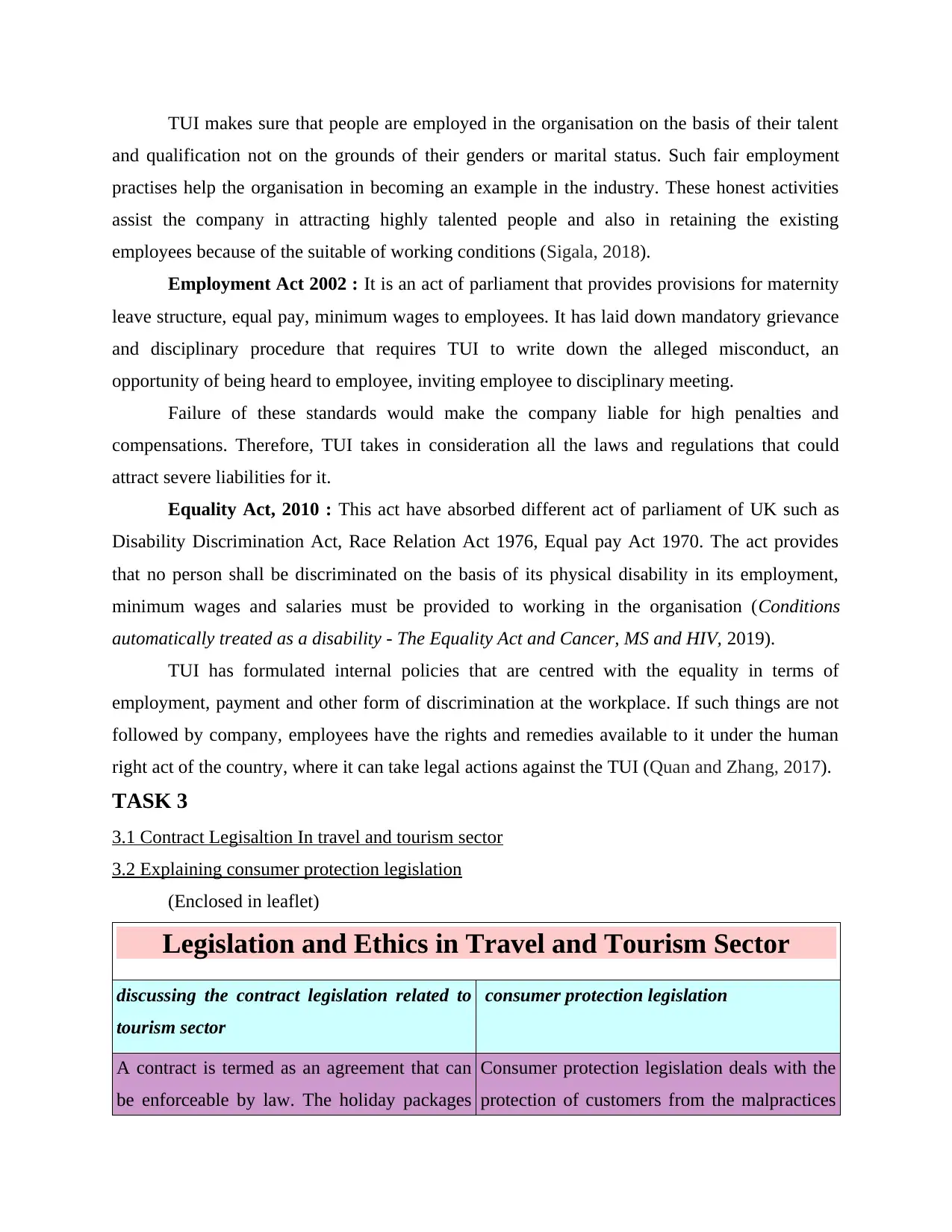
TUI makes sure that people are employed in the organisation on the basis of their talent
and qualification not on the grounds of their genders or marital status. Such fair employment
practises help the organisation in becoming an example in the industry. These honest activities
assist the company in attracting highly talented people and also in retaining the existing
employees because of the suitable of working conditions (Sigala, 2018).
Employment Act 2002 : It is an act of parliament that provides provisions for maternity
leave structure, equal pay, minimum wages to employees. It has laid down mandatory grievance
and disciplinary procedure that requires TUI to write down the alleged misconduct, an
opportunity of being heard to employee, inviting employee to disciplinary meeting.
Failure of these standards would make the company liable for high penalties and
compensations. Therefore, TUI takes in consideration all the laws and regulations that could
attract severe liabilities for it.
Equality Act, 2010 : This act have absorbed different act of parliament of UK such as
Disability Discrimination Act, Race Relation Act 1976, Equal pay Act 1970. The act provides
that no person shall be discriminated on the basis of its physical disability in its employment,
minimum wages and salaries must be provided to working in the organisation (Conditions
automatically treated as a disability - The Equality Act and Cancer, MS and HIV, 2019).
TUI has formulated internal policies that are centred with the equality in terms of
employment, payment and other form of discrimination at the workplace. If such things are not
followed by company, employees have the rights and remedies available to it under the human
right act of the country, where it can take legal actions against the TUI (Quan and Zhang, 2017).
TASK 3
3.1 Contract Legisaltion In travel and tourism sector
3.2 Explaining consumer protection legislation
(Enclosed in leaflet)
Legislation and Ethics in Travel and Tourism Sector
discussing the contract legislation related to
tourism sector
consumer protection legislation
A contract is termed as an agreement that can
be enforceable by law. The holiday packages
Consumer protection legislation deals with the
protection of customers from the malpractices
and qualification not on the grounds of their genders or marital status. Such fair employment
practises help the organisation in becoming an example in the industry. These honest activities
assist the company in attracting highly talented people and also in retaining the existing
employees because of the suitable of working conditions (Sigala, 2018).
Employment Act 2002 : It is an act of parliament that provides provisions for maternity
leave structure, equal pay, minimum wages to employees. It has laid down mandatory grievance
and disciplinary procedure that requires TUI to write down the alleged misconduct, an
opportunity of being heard to employee, inviting employee to disciplinary meeting.
Failure of these standards would make the company liable for high penalties and
compensations. Therefore, TUI takes in consideration all the laws and regulations that could
attract severe liabilities for it.
Equality Act, 2010 : This act have absorbed different act of parliament of UK such as
Disability Discrimination Act, Race Relation Act 1976, Equal pay Act 1970. The act provides
that no person shall be discriminated on the basis of its physical disability in its employment,
minimum wages and salaries must be provided to working in the organisation (Conditions
automatically treated as a disability - The Equality Act and Cancer, MS and HIV, 2019).
TUI has formulated internal policies that are centred with the equality in terms of
employment, payment and other form of discrimination at the workplace. If such things are not
followed by company, employees have the rights and remedies available to it under the human
right act of the country, where it can take legal actions against the TUI (Quan and Zhang, 2017).
TASK 3
3.1 Contract Legisaltion In travel and tourism sector
3.2 Explaining consumer protection legislation
(Enclosed in leaflet)
Legislation and Ethics in Travel and Tourism Sector
discussing the contract legislation related to
tourism sector
consumer protection legislation
A contract is termed as an agreement that can
be enforceable by law. The holiday packages
Consumer protection legislation deals with the
protection of customers from the malpractices
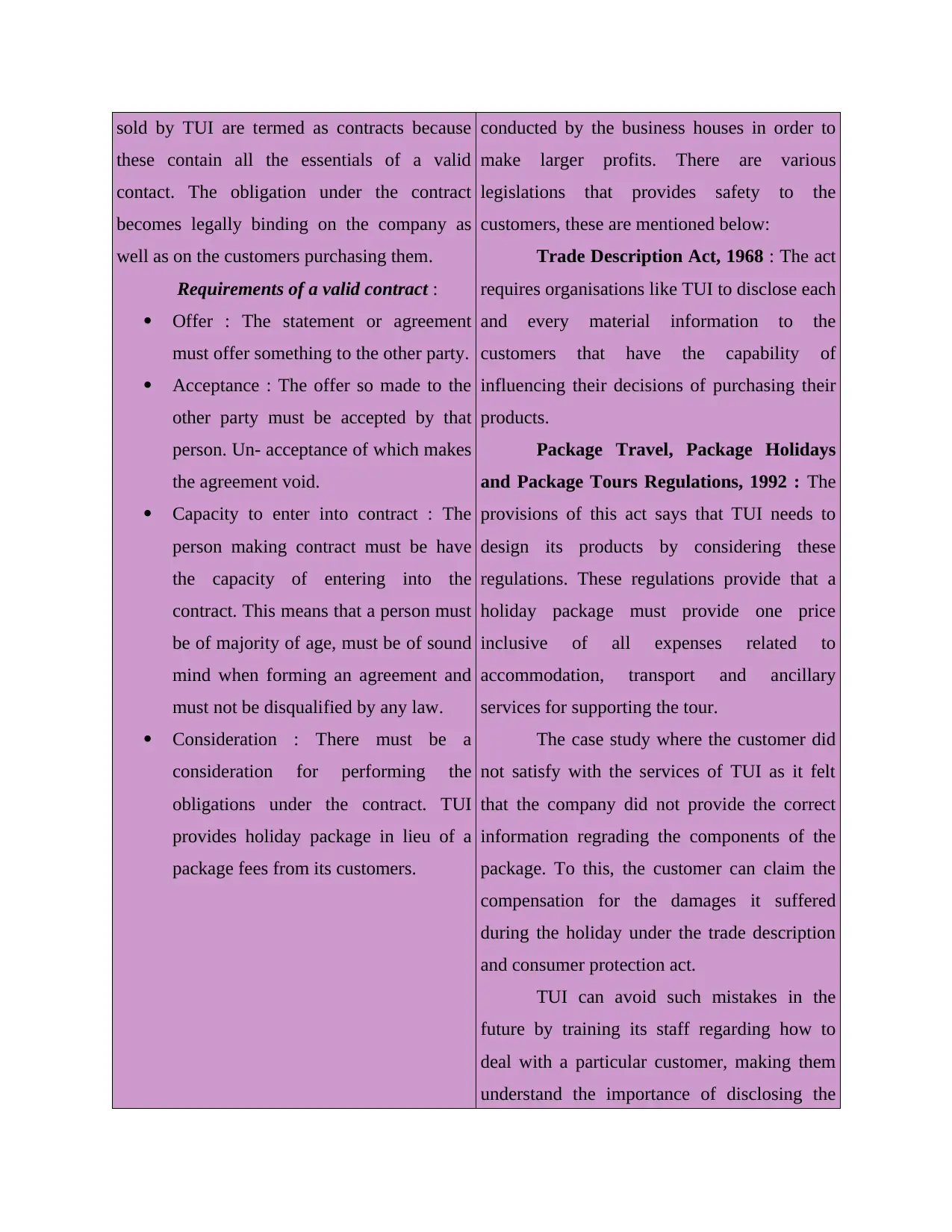
sold by TUI are termed as contracts because
these contain all the essentials of a valid
contact. The obligation under the contract
becomes legally binding on the company as
well as on the customers purchasing them.
Requirements of a valid contract :
Offer : The statement or agreement
must offer something to the other party.
Acceptance : The offer so made to the
other party must be accepted by that
person. Un- acceptance of which makes
the agreement void.
Capacity to enter into contract : The
person making contract must be have
the capacity of entering into the
contract. This means that a person must
be of majority of age, must be of sound
mind when forming an agreement and
must not be disqualified by any law.
Consideration : There must be a
consideration for performing the
obligations under the contract. TUI
provides holiday package in lieu of a
package fees from its customers.
conducted by the business houses in order to
make larger profits. There are various
legislations that provides safety to the
customers, these are mentioned below:
Trade Description Act, 1968 : The act
requires organisations like TUI to disclose each
and every material information to the
customers that have the capability of
influencing their decisions of purchasing their
products.
Package Travel, Package Holidays
and Package Tours Regulations, 1992 : The
provisions of this act says that TUI needs to
design its products by considering these
regulations. These regulations provide that a
holiday package must provide one price
inclusive of all expenses related to
accommodation, transport and ancillary
services for supporting the tour.
The case study where the customer did
not satisfy with the services of TUI as it felt
that the company did not provide the correct
information regrading the components of the
package. To this, the customer can claim the
compensation for the damages it suffered
during the holiday under the trade description
and consumer protection act.
TUI can avoid such mistakes in the
future by training its staff regarding how to
deal with a particular customer, making them
understand the importance of disclosing the
these contain all the essentials of a valid
contact. The obligation under the contract
becomes legally binding on the company as
well as on the customers purchasing them.
Requirements of a valid contract :
Offer : The statement or agreement
must offer something to the other party.
Acceptance : The offer so made to the
other party must be accepted by that
person. Un- acceptance of which makes
the agreement void.
Capacity to enter into contract : The
person making contract must be have
the capacity of entering into the
contract. This means that a person must
be of majority of age, must be of sound
mind when forming an agreement and
must not be disqualified by any law.
Consideration : There must be a
consideration for performing the
obligations under the contract. TUI
provides holiday package in lieu of a
package fees from its customers.
conducted by the business houses in order to
make larger profits. There are various
legislations that provides safety to the
customers, these are mentioned below:
Trade Description Act, 1968 : The act
requires organisations like TUI to disclose each
and every material information to the
customers that have the capability of
influencing their decisions of purchasing their
products.
Package Travel, Package Holidays
and Package Tours Regulations, 1992 : The
provisions of this act says that TUI needs to
design its products by considering these
regulations. These regulations provide that a
holiday package must provide one price
inclusive of all expenses related to
accommodation, transport and ancillary
services for supporting the tour.
The case study where the customer did
not satisfy with the services of TUI as it felt
that the company did not provide the correct
information regrading the components of the
package. To this, the customer can claim the
compensation for the damages it suffered
during the holiday under the trade description
and consumer protection act.
TUI can avoid such mistakes in the
future by training its staff regarding how to
deal with a particular customer, making them
understand the importance of disclosing the
⊘ This is a preview!⊘
Do you want full access?
Subscribe today to unlock all pages.

Trusted by 1+ million students worldwide
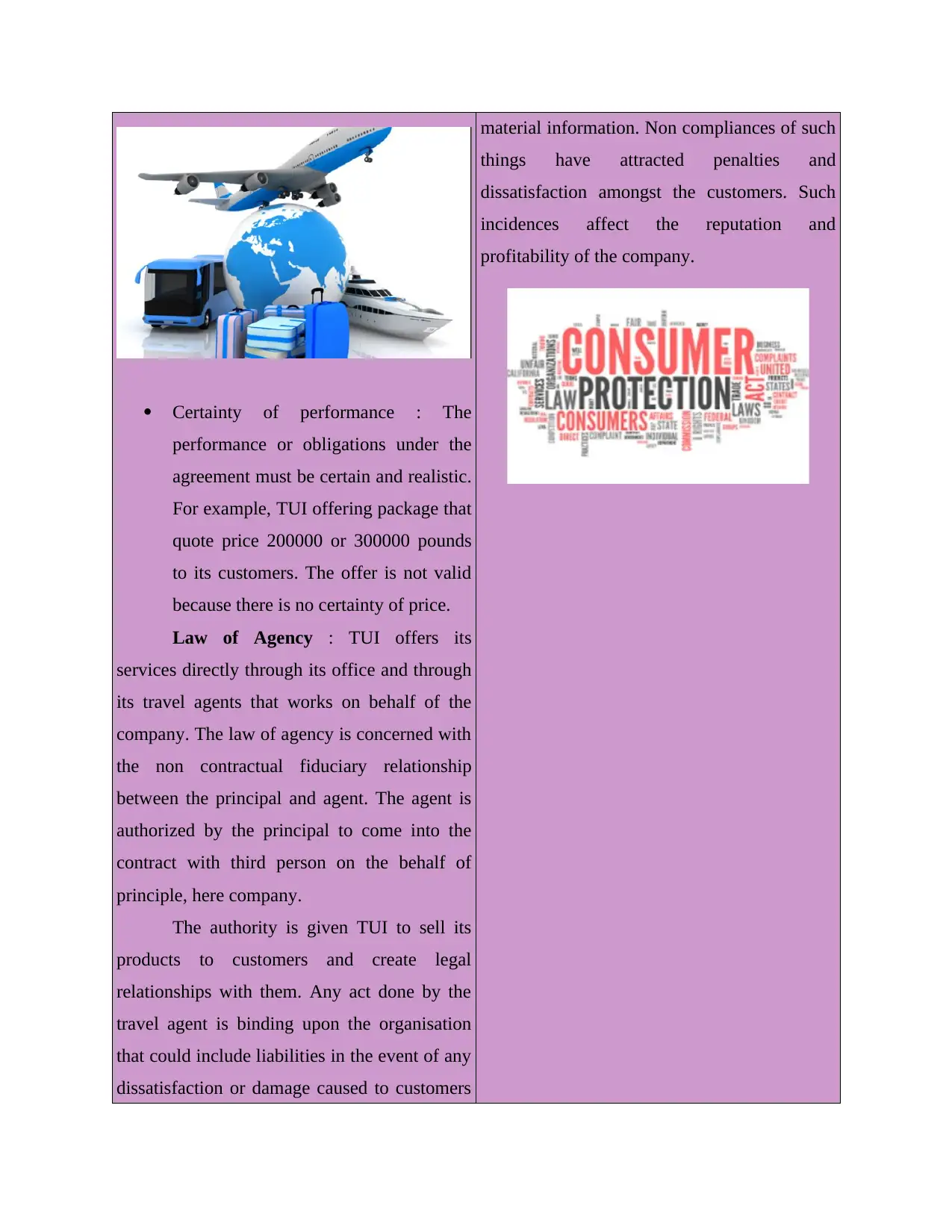
Certainty of performance : The
performance or obligations under the
agreement must be certain and realistic.
For example, TUI offering package that
quote price 200000 or 300000 pounds
to its customers. The offer is not valid
because there is no certainty of price.
Law of Agency : TUI offers its
services directly through its office and through
its travel agents that works on behalf of the
company. The law of agency is concerned with
the non contractual fiduciary relationship
between the principal and agent. The agent is
authorized by the principal to come into the
contract with third person on the behalf of
principle, here company.
The authority is given TUI to sell its
products to customers and create legal
relationships with them. Any act done by the
travel agent is binding upon the organisation
that could include liabilities in the event of any
dissatisfaction or damage caused to customers
material information. Non compliances of such
things have attracted penalties and
dissatisfaction amongst the customers. Such
incidences affect the reputation and
profitability of the company.
performance or obligations under the
agreement must be certain and realistic.
For example, TUI offering package that
quote price 200000 or 300000 pounds
to its customers. The offer is not valid
because there is no certainty of price.
Law of Agency : TUI offers its
services directly through its office and through
its travel agents that works on behalf of the
company. The law of agency is concerned with
the non contractual fiduciary relationship
between the principal and agent. The agent is
authorized by the principal to come into the
contract with third person on the behalf of
principle, here company.
The authority is given TUI to sell its
products to customers and create legal
relationships with them. Any act done by the
travel agent is binding upon the organisation
that could include liabilities in the event of any
dissatisfaction or damage caused to customers
material information. Non compliances of such
things have attracted penalties and
dissatisfaction amongst the customers. Such
incidences affect the reputation and
profitability of the company.
Paraphrase This Document
Need a fresh take? Get an instant paraphrase of this document with our AI Paraphraser
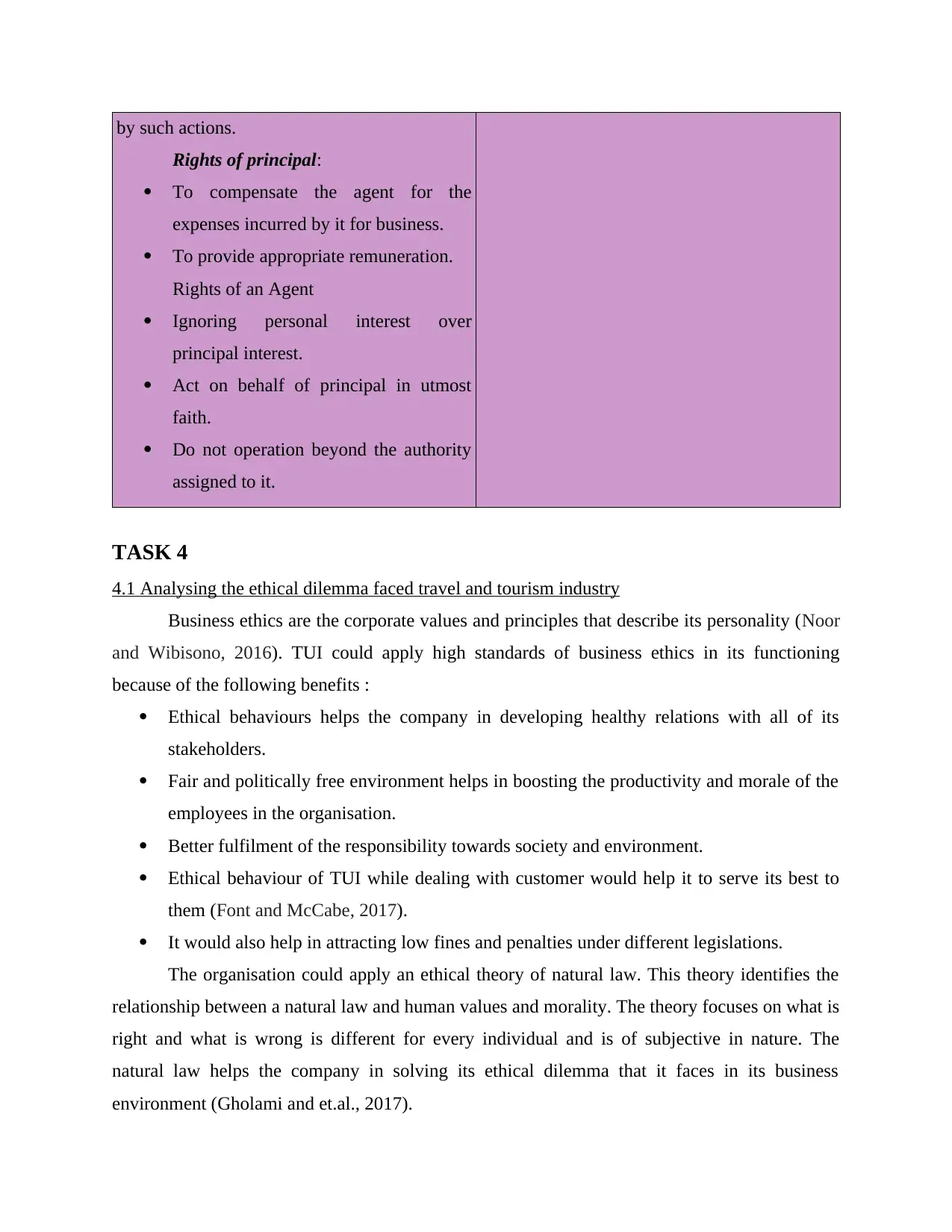
by such actions.
Rights of principal:
To compensate the agent for the
expenses incurred by it for business.
To provide appropriate remuneration.
Rights of an Agent
Ignoring personal interest over
principal interest.
Act on behalf of principal in utmost
faith.
Do not operation beyond the authority
assigned to it.
TASK 4
4.1 Analysing the ethical dilemma faced travel and tourism industry
Business ethics are the corporate values and principles that describe its personality (Noor
and Wibisono, 2016). TUI could apply high standards of business ethics in its functioning
because of the following benefits :
Ethical behaviours helps the company in developing healthy relations with all of its
stakeholders.
Fair and politically free environment helps in boosting the productivity and morale of the
employees in the organisation.
Better fulfilment of the responsibility towards society and environment.
Ethical behaviour of TUI while dealing with customer would help it to serve its best to
them (Font and McCabe, 2017).
It would also help in attracting low fines and penalties under different legislations.
The organisation could apply an ethical theory of natural law. This theory identifies the
relationship between a natural law and human values and morality. The theory focuses on what is
right and what is wrong is different for every individual and is of subjective in nature. The
natural law helps the company in solving its ethical dilemma that it faces in its business
environment (Gholami and et.al., 2017).
Rights of principal:
To compensate the agent for the
expenses incurred by it for business.
To provide appropriate remuneration.
Rights of an Agent
Ignoring personal interest over
principal interest.
Act on behalf of principal in utmost
faith.
Do not operation beyond the authority
assigned to it.
TASK 4
4.1 Analysing the ethical dilemma faced travel and tourism industry
Business ethics are the corporate values and principles that describe its personality (Noor
and Wibisono, 2016). TUI could apply high standards of business ethics in its functioning
because of the following benefits :
Ethical behaviours helps the company in developing healthy relations with all of its
stakeholders.
Fair and politically free environment helps in boosting the productivity and morale of the
employees in the organisation.
Better fulfilment of the responsibility towards society and environment.
Ethical behaviour of TUI while dealing with customer would help it to serve its best to
them (Font and McCabe, 2017).
It would also help in attracting low fines and penalties under different legislations.
The organisation could apply an ethical theory of natural law. This theory identifies the
relationship between a natural law and human values and morality. The theory focuses on what is
right and what is wrong is different for every individual and is of subjective in nature. The
natural law helps the company in solving its ethical dilemma that it faces in its business
environment (Gholami and et.al., 2017).
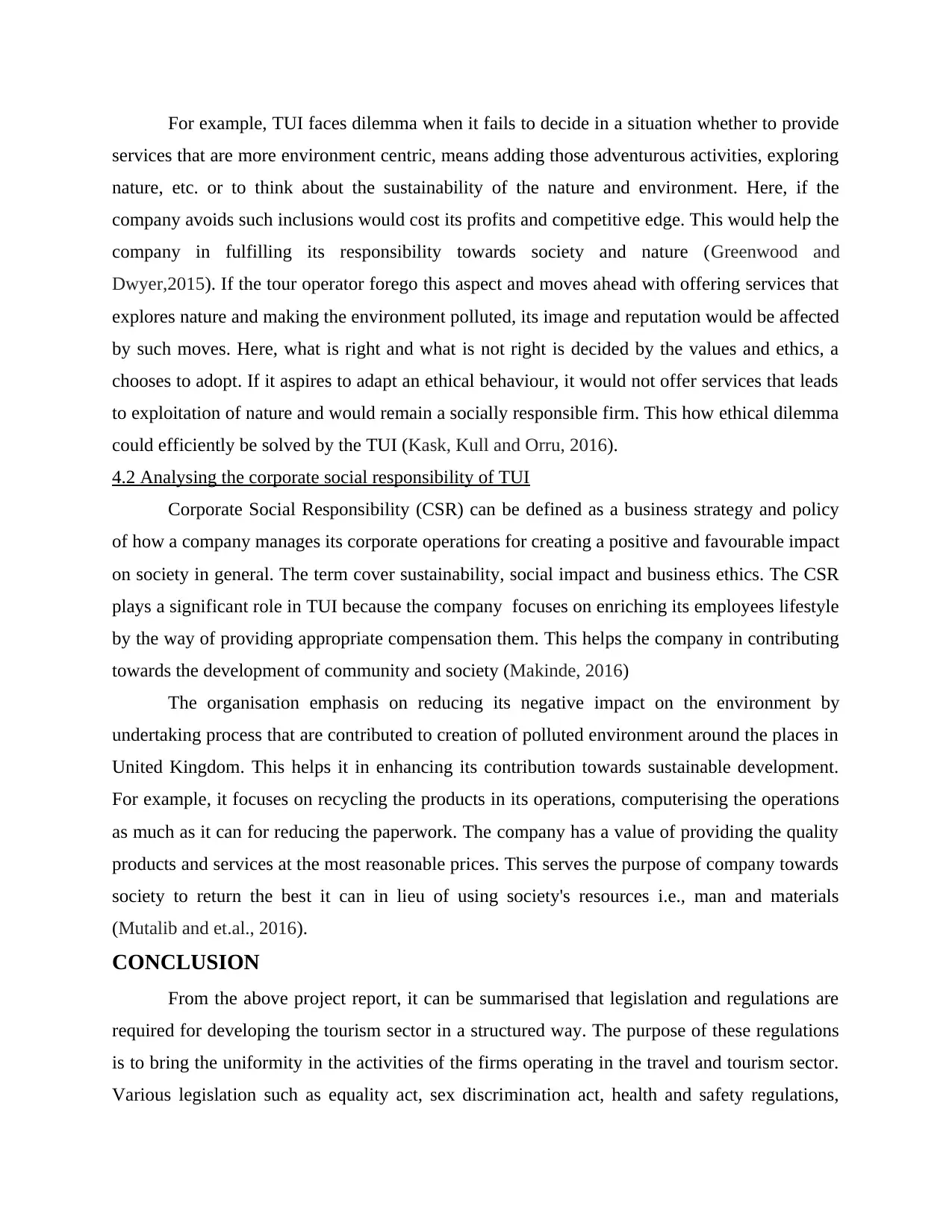
For example, TUI faces dilemma when it fails to decide in a situation whether to provide
services that are more environment centric, means adding those adventurous activities, exploring
nature, etc. or to think about the sustainability of the nature and environment. Here, if the
company avoids such inclusions would cost its profits and competitive edge. This would help the
company in fulfilling its responsibility towards society and nature (Greenwood and
Dwyer,2015). If the tour operator forego this aspect and moves ahead with offering services that
explores nature and making the environment polluted, its image and reputation would be affected
by such moves. Here, what is right and what is not right is decided by the values and ethics, a
chooses to adopt. If it aspires to adapt an ethical behaviour, it would not offer services that leads
to exploitation of nature and would remain a socially responsible firm. This how ethical dilemma
could efficiently be solved by the TUI (Kask, Kull and Orru, 2016).
4.2 Analysing the corporate social responsibility of TUI
Corporate Social Responsibility (CSR) can be defined as a business strategy and policy
of how a company manages its corporate operations for creating a positive and favourable impact
on society in general. The term cover sustainability, social impact and business ethics. The CSR
plays a significant role in TUI because the company focuses on enriching its employees lifestyle
by the way of providing appropriate compensation them. This helps the company in contributing
towards the development of community and society (Makinde, 2016)
The organisation emphasis on reducing its negative impact on the environment by
undertaking process that are contributed to creation of polluted environment around the places in
United Kingdom. This helps it in enhancing its contribution towards sustainable development.
For example, it focuses on recycling the products in its operations, computerising the operations
as much as it can for reducing the paperwork. The company has a value of providing the quality
products and services at the most reasonable prices. This serves the purpose of company towards
society to return the best it can in lieu of using society's resources i.e., man and materials
(Mutalib and et.al., 2016).
CONCLUSION
From the above project report, it can be summarised that legislation and regulations are
required for developing the tourism sector in a structured way. The purpose of these regulations
is to bring the uniformity in the activities of the firms operating in the travel and tourism sector.
Various legislation such as equality act, sex discrimination act, health and safety regulations,
services that are more environment centric, means adding those adventurous activities, exploring
nature, etc. or to think about the sustainability of the nature and environment. Here, if the
company avoids such inclusions would cost its profits and competitive edge. This would help the
company in fulfilling its responsibility towards society and nature (Greenwood and
Dwyer,2015). If the tour operator forego this aspect and moves ahead with offering services that
explores nature and making the environment polluted, its image and reputation would be affected
by such moves. Here, what is right and what is not right is decided by the values and ethics, a
chooses to adopt. If it aspires to adapt an ethical behaviour, it would not offer services that leads
to exploitation of nature and would remain a socially responsible firm. This how ethical dilemma
could efficiently be solved by the TUI (Kask, Kull and Orru, 2016).
4.2 Analysing the corporate social responsibility of TUI
Corporate Social Responsibility (CSR) can be defined as a business strategy and policy
of how a company manages its corporate operations for creating a positive and favourable impact
on society in general. The term cover sustainability, social impact and business ethics. The CSR
plays a significant role in TUI because the company focuses on enriching its employees lifestyle
by the way of providing appropriate compensation them. This helps the company in contributing
towards the development of community and society (Makinde, 2016)
The organisation emphasis on reducing its negative impact on the environment by
undertaking process that are contributed to creation of polluted environment around the places in
United Kingdom. This helps it in enhancing its contribution towards sustainable development.
For example, it focuses on recycling the products in its operations, computerising the operations
as much as it can for reducing the paperwork. The company has a value of providing the quality
products and services at the most reasonable prices. This serves the purpose of company towards
society to return the best it can in lieu of using society's resources i.e., man and materials
(Mutalib and et.al., 2016).
CONCLUSION
From the above project report, it can be summarised that legislation and regulations are
required for developing the tourism sector in a structured way. The purpose of these regulations
is to bring the uniformity in the activities of the firms operating in the travel and tourism sector.
Various legislation such as equality act, sex discrimination act, health and safety regulations,
⊘ This is a preview!⊘
Do you want full access?
Subscribe today to unlock all pages.

Trusted by 1+ million students worldwide
1 out of 15
Related Documents
Your All-in-One AI-Powered Toolkit for Academic Success.
+13062052269
info@desklib.com
Available 24*7 on WhatsApp / Email
![[object Object]](/_next/static/media/star-bottom.7253800d.svg)
Unlock your academic potential
Copyright © 2020–2026 A2Z Services. All Rights Reserved. Developed and managed by ZUCOL.


